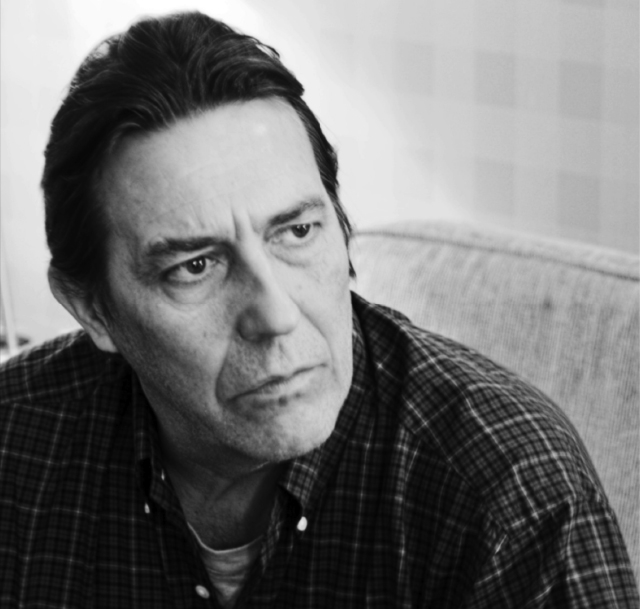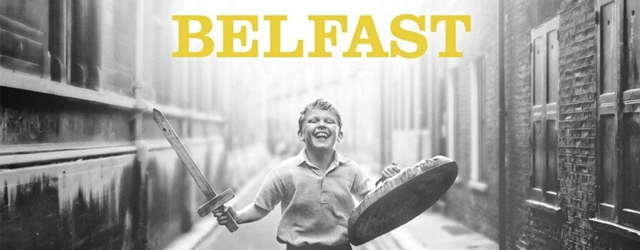By Nathan Lerner | Film Critic
After a year-long hiatus from live screenings, the Philadelphia Film Festival returned with a hybrid platform which offered both virtual and in-person options.
On opening night of the festival, returning cinephiles were treated to a live advanced viewing of Belfast. The film has now been released theatrically to the general public. Semi-autobiographical in nature, the coming of age tale is the latest work, written and directed by Sir Kenneth Branagh.
Set in the capital city of Northern Ireland, the film explicitly begins in mid-August of 1969. An introductory scene introduces us to our protagonist, nine-year old Buddy (Jude Hill). He is having a fun time, playing a Medieval knight errant, while wielding a makeshift toy sword and trash can lid as his shield. Abruptly, his idyllic imaginings are interrupted by bleak reality.
An agitated mob of Protestant Unionists from the Shank Hill section of town descend upon the block, where Buddy lives with his older brother, and parents. The interlopers are intent upon intimidating Catholics and displacing them from the area. They indiscriminately launch a fusillade of rocks and bricks at block residents, oblivious to the religious affiliation of their targets. This includes Buddy’s working class Protestant family.

Photo | Katharine Gilbert
The violence quickly escalates as Molotov cocktails come hurtling though the air, igniting explosions of cars parked curbside. Buddy’s mother (Caitriona Balfe) emerges from the house, grabs the trash can lid out of Jamie’s quivering hand, then lifts it to protect both of them from airborne projectiles. It is a bravura vignette, which frames the irrationality of sectarian hatred and reduces it to an intensely personal scale.
Buddy’s father (Jamie Dornan) is often away, working in London, where he has found employment as a pipefitter. He is beset with a dilemma, forced to choose between his remunerative job and being at home with his family during precarious times.
Buddy’s father broaches the advantages of emigrating to Vancouver, Canada or Sydney, Australia, to escape the turbulence that surrounds the family. However, Buddy’s mother vehemently opposes the notion of uprooting from their hometown, thereby leaving their close, extended family and friends behind.
Contrasting with the hatemongers around them, Buddy’s family practices tolerance. They are a Protestant family, who live in harmony with their Catholic neighbors. Buddy’s paternal grandmother (Judi Dench) proclaims that her best friend and shopping companion is a Hindu vegetarian from India. When Buddy develops a crush on a pretty Catholic classmate, he asks his father whether they can possibly have a future together. Buddy is assured that as long as they love one another, there is no reason why they can’t be happily married.
Without ever devolving into dogmatism, the heartfelt film emerges as Branagh’s cinematic paean to acceptance and compassion in the face of sectarian bigotry.
The acting is top-notch, with nary a poor performance from any cast member. In their roles as Buddy’s parents, Caitriona Balfe and Jamie Dornan, provide a strikingly handsome couple. Despite the couple’s ongoing dispute over how to deal with volatile circumstances, they remain obviously smitten with one another.
Old pros, Judi Dench and Ciarán Hinds, as Buddy’s doting paternal grandparents, offer jocular badinage. The humorous exchanges come as a welcome antidote to the intermittent grimness of the film. However, the film ultimately belongs to its likeable lead, Jude Hill. His poised, naturalistic performance as a wide-eyed innocent belies the fact that Belfast constitutes his screen debut.
The film’s production values are superb. Cinematographer, Haris Zambarloukos, has crafted the vast preponderance of the film in stark black and white This confers an air of documentary-like verisimilitude to the narrative. To capture the protagonist’s perspective, the film is shot largely from below the eye level of an adult. The adroit editing by Una Ni Dhonghalie provides a taut, well-paced result.
The production design by Jim Clay, set decoration by Claire Nia Richards, and costume design by Charlotte Walter work synergistically to provide a strong sense of time and place.
The visual text is buttressed by a sound track, chocked full of songs by Van Morrison, a native of Northern Ireland. Most of them are culled from his acclaimed Astral Weeks album. The compositions catapulted Van Morrison to international superstardom, just as the world turned its attention to coverage of The Troubles.
Branagh has accrued a variegated filmography as a multi-talented thespian, screenwriter, and director. Commencing early in his career, he made his mark with a sextet of Shakespearean film adaptations. Availing himself of the advantages of staging on the big screen, Branagh excelled at opening up the Bard’s classic works. His career has also included decidedly less highbrow fare. Branagh even ventured into the Marvel Cinematic Universe as the helmsman of Thor as well as the post-credits scene in Ironman 2.
Epitomizing his versatility, Branagh has been nominated for five Academy Awards in five different categories. He garnered nominations as Best Director and Best Actor in Henry V, Best Live Action Short Film for Swan Song, Best Adapted Screenplay for Hamlet, and Best Supporting Actor for My Week with Marilyn.
However, until now, the coveted golden statuette has eluded Branagh. The undeniable excellence of Belfast may well put an end to that situation.
*PG-13 (for some violence and strong language) 97 minutes
Nathan Lerner served as a syndicated Film Critic with the Montgomery Newspapers Chain for over 20 years. He welcomes feedback at lernerprose@gmail.com.

